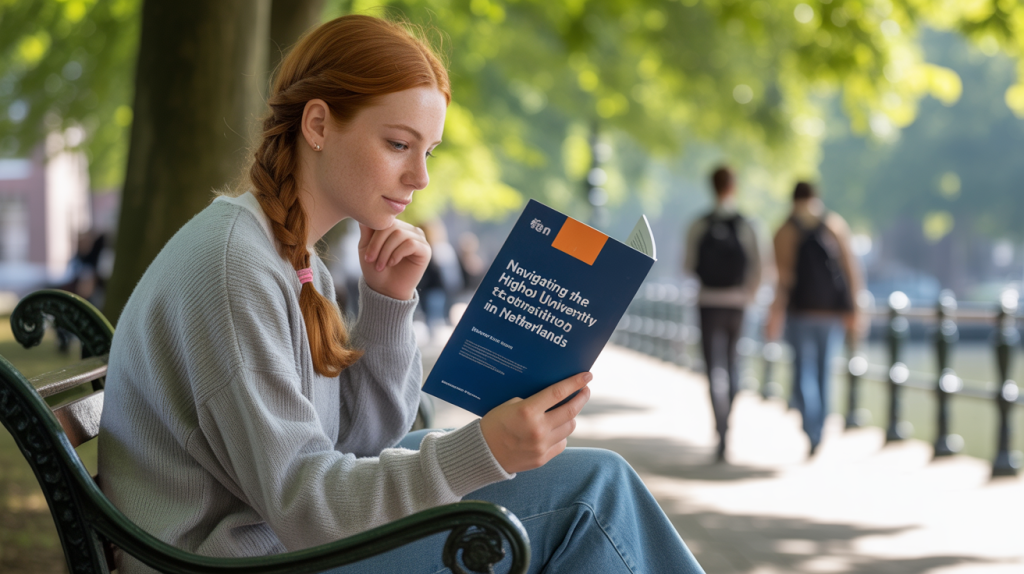Navigating the Transition from High School to University in the Netherlands: A Comprehensive Guide for International Student Recruiters and Education Professionals
Preparatory Programs
Learning Skills
Admission Requirements
Practical Tips
Support from Study in Netherlands
Call to Action
Key Differences Between High School and University in the Netherlands
Understanding the structural and academic differences between Dutch secondary education and university is essential for guiding students toward success.
Dutch Secondary Education Tracks and University Eligibility
In the Netherlands, secondary education consists of several distinct tracks:
- VMBO (Preparatory Secondary Vocational Education): Focused on practical and vocational skills.
- HAVO (Senior General Secondary Education): Typically a five-year program preparing students for universities of applied sciences (HBO).
- VWO (Pre-University Education): A six-year track qualifying students for research universities.
Typically, VWO graduates are directly eligible for university admission, while HAVO graduates often proceed to universities of applied sciences offering professionally oriented programs.
Academic Structure and Expectations
University education differs markedly from secondary school in terms of:
- Independent Learning: Dutch universities emphasize self-motivation, critical thinking, and autonomous study.
- Flexible Scheduling: Unlike the rigid timetable of high school, students must manage their own time, balancing lectures, seminars, and extensive self-study.
- Workload Management: Students are expected to invest significant time outside the classroom, often juggling multiple assignments and projects simultaneously.
For recruiters and university admissions teams, communicating these expectations to prospective students is a vital step in preparing them for the academic realities ahead.
Preparatory and Bridging Programs: Supporting Student Success
To support students in making this leap, many Dutch institutions offer transition years or bridging programs (schakeljaar). These initiatives play a key role in preparing students academically and linguistically for university-level study.
What is a Transition Year?
A transition year is a preparatory course designed to build foundational skills required for success at university. It typically features:
- 20 to 30 hours of weekly lessons focusing on developing knowledge and study skills.
- An additional 10 to 20 hours of self-study to encourage autonomy.
- Curricula emphasizing independent learning, group work, presentations, and project-based assignments.
Benefits of Bridging Programs
Bridging courses help students by:
- Closing academic gaps for those who do not meet direct admission criteria.
- Enhancing language proficiency, with required Dutch B1 or English A2 levels depending on the program.
- Fostering essential study attitudes such as time management and proactive engagement.
International student recruitment professionals should highlight these programs as effective pathways, particularly for students transitioning from different education systems.
Learning Skills and Study Attitude: What Universities Expect
Transitioning students must cultivate specific skills to thrive in the Dutch university environment.
Key Skills for Academic Success
- Self-Directed Learning: Universities expect students to take ownership of their education, seeking resources and managing deadlines effectively.
- Active Participation: Engaging in discussions, group work, and collaborative projects is fundamental.
- Research and Critical Thinking: Independent research and analytical skills are heavily emphasized.
Developing a Positive Study Attitude
Students who adapt well often demonstrate:
- Motivation and discipline in managing complex workloads.
- Openness to feedback and a willingness to refine skills.
- Effective communication skills for presentations and teamwork.
Recruiters and admissions teams should advise prospective students on cultivating these habits before enrollment and promote resources such as orientation sessions and academic skills workshops.
Admission and Language Requirements: Ensuring Eligibility and Preparedness
Dutch universities maintain specific admission requirements that vary by program and institution but generally include the following elements:
Academic Credentials
- VWO diploma holders are eligible for research universities.
- HAVO diploma holders typically route to universities of applied sciences.
- Credential evaluation is common for international applicants to ensure comparability.
Language Proficiency
- For Dutch-taught programs, a minimum Dutch language proficiency level of B1 is generally required.
- For English-taught programs, an English proficiency level equivalent to A2 or higher is necessary.
- Some programs may demand higher levels, depending on the field of study.
Agencies specializing in international student placement can add value by helping students meet these requirements through targeted language training and credential verification.
Practical Tips for a Successful Transition
Drawing from extensive research and best practices, here are actionable strategies for helping students navigate this important phase:
- Start Early: Encourage students to begin the application and orientation process well before enrollment.
- Utilize Orientation Programs: These initiatives introduce students to campus resources, academic expectations, and social networks.
- Develop Time Management Skills: Skills such as scheduling study sessions and prioritizing tasks are crucial for maintaining balance.
- Consider Bridging Programs: If students feel underprepared, bridging courses offer a structured environment to build confidence and competence.
- Leverage Support Services: Universities often provide counseling, academic tutoring, and language help – make sure students are aware and encouraged to use these.
These tips ensure that students not only meet admission criteria but also adapt and flourish in Dutch higher education settings.
How Study in Netherlands Supports International Student Recruitment and Transitions
At Study in Netherlands, we leverage our expertise in education recruitment to streamline the transition process for students and institutions alike.
Integrated Solutions for Recruiters and Admissions Teams
- Advanced Automation Tools: Simplify application processing, credential verification, and communication workflows.
- Tailored Recruitment Strategies: Connect institutions with quality international candidates using data-driven campaigns.
- Comprehensive Guidance Materials: Equip advisors and students with up-to-date information on admission pathways, programs, and preparatory options.
Empowering Education Professionals and Agencies
Our platform offers resources designed for HR, marketing teams, and student placement agencies to maximize outreach effectiveness and enhance student experience from inquiry through enrollment.
By partnering with Study in Netherlands, your organization benefits from industry-leading recruitment expertise combined with efficient automation, ensuring international students are well-informed and well-prepared for their Dutch university journey.
Take the Next Step with Study in Netherlands
Are you ready to enhance your international student recruitment and support seamless transitions into Dutch higher education?

